Analysis of Management Communication in Virtual Team Environments
VerifiedAdded on 2023/05/29
|6
|1332
|258
Report
AI Summary
This report provides a comprehensive review of an article concerning management communication within virtual teams. The article explores the impact of virtual team dynamics on productivity, emphasizing the challenges posed by cultural differences and the importance of trust, knowledge sharing, and collaboration among team members. The review delves into the research model, which correlates knowledge sharing, collaboration, and team effectiveness. It examines the significance of Information and Communication Technologies (ICT) in improving workplace communication and the effects of national cultural diversity on team processes. Furthermore, the report addresses issues such as social loafing and suggests strategies for managers to enhance team performance, including recruiting smaller teams and establishing clear engagement rules. The conclusion highlights the evolution of virtual teams, the role of new technologies, and the themes that contribute to the success of virtual teams. References to key research papers are included to support the analysis.
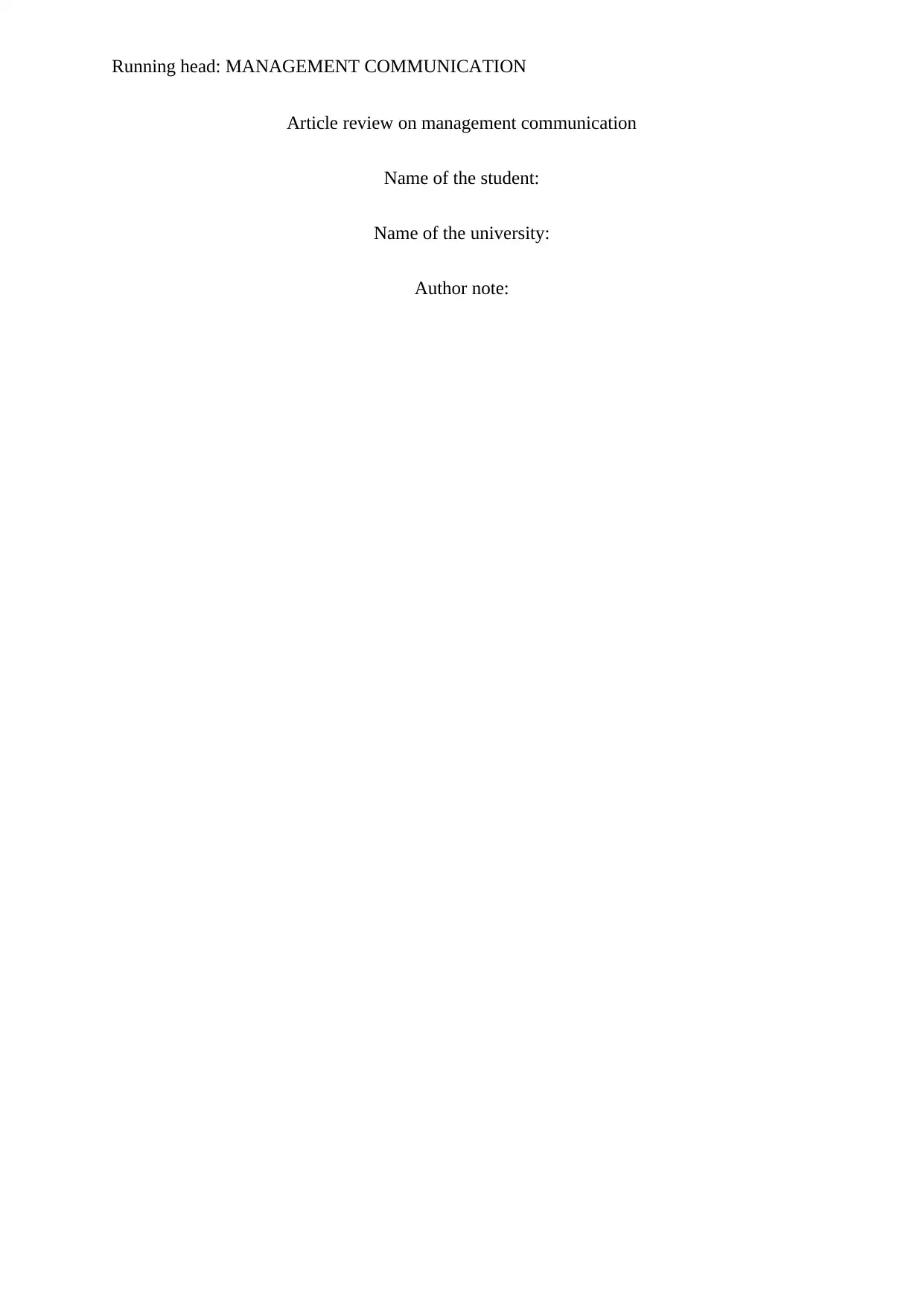
Running head: MANAGEMENT COMMUNICATION
Article review on management communication
Name of the student:
Name of the university:
Author note:
Article review on management communication
Name of the student:
Name of the university:
Author note:
Paraphrase This Document
Need a fresh take? Get an instant paraphrase of this document with our AI Paraphraser
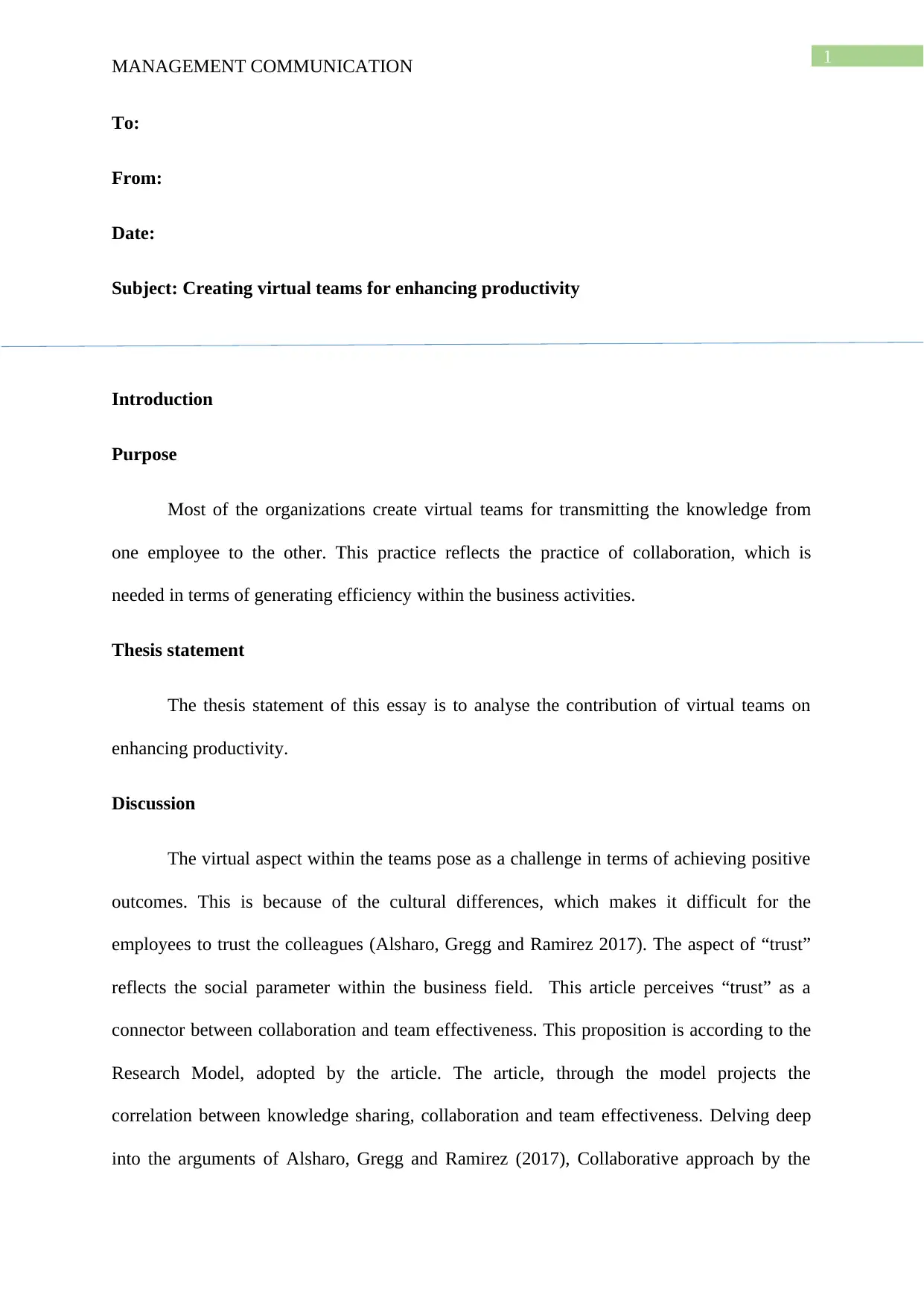
1
MANAGEMENT COMMUNICATION
To:
From:
Date:
Subject: Creating virtual teams for enhancing productivity
Introduction
Purpose
Most of the organizations create virtual teams for transmitting the knowledge from
one employee to the other. This practice reflects the practice of collaboration, which is
needed in terms of generating efficiency within the business activities.
Thesis statement
The thesis statement of this essay is to analyse the contribution of virtual teams on
enhancing productivity.
Discussion
The virtual aspect within the teams pose as a challenge in terms of achieving positive
outcomes. This is because of the cultural differences, which makes it difficult for the
employees to trust the colleagues (Alsharo, Gregg and Ramirez 2017). The aspect of “trust”
reflects the social parameter within the business field. This article perceives “trust” as a
connector between collaboration and team effectiveness. This proposition is according to the
Research Model, adopted by the article. The article, through the model projects the
correlation between knowledge sharing, collaboration and team effectiveness. Delving deep
into the arguments of Alsharo, Gregg and Ramirez (2017), Collaborative approach by the
MANAGEMENT COMMUNICATION
To:
From:
Date:
Subject: Creating virtual teams for enhancing productivity
Introduction
Purpose
Most of the organizations create virtual teams for transmitting the knowledge from
one employee to the other. This practice reflects the practice of collaboration, which is
needed in terms of generating efficiency within the business activities.
Thesis statement
The thesis statement of this essay is to analyse the contribution of virtual teams on
enhancing productivity.
Discussion
The virtual aspect within the teams pose as a challenge in terms of achieving positive
outcomes. This is because of the cultural differences, which makes it difficult for the
employees to trust the colleagues (Alsharo, Gregg and Ramirez 2017). The aspect of “trust”
reflects the social parameter within the business field. This article perceives “trust” as a
connector between collaboration and team effectiveness. This proposition is according to the
Research Model, adopted by the article. The article, through the model projects the
correlation between knowledge sharing, collaboration and team effectiveness. Delving deep
into the arguments of Alsharo, Gregg and Ramirez (2017), Collaborative approach by the
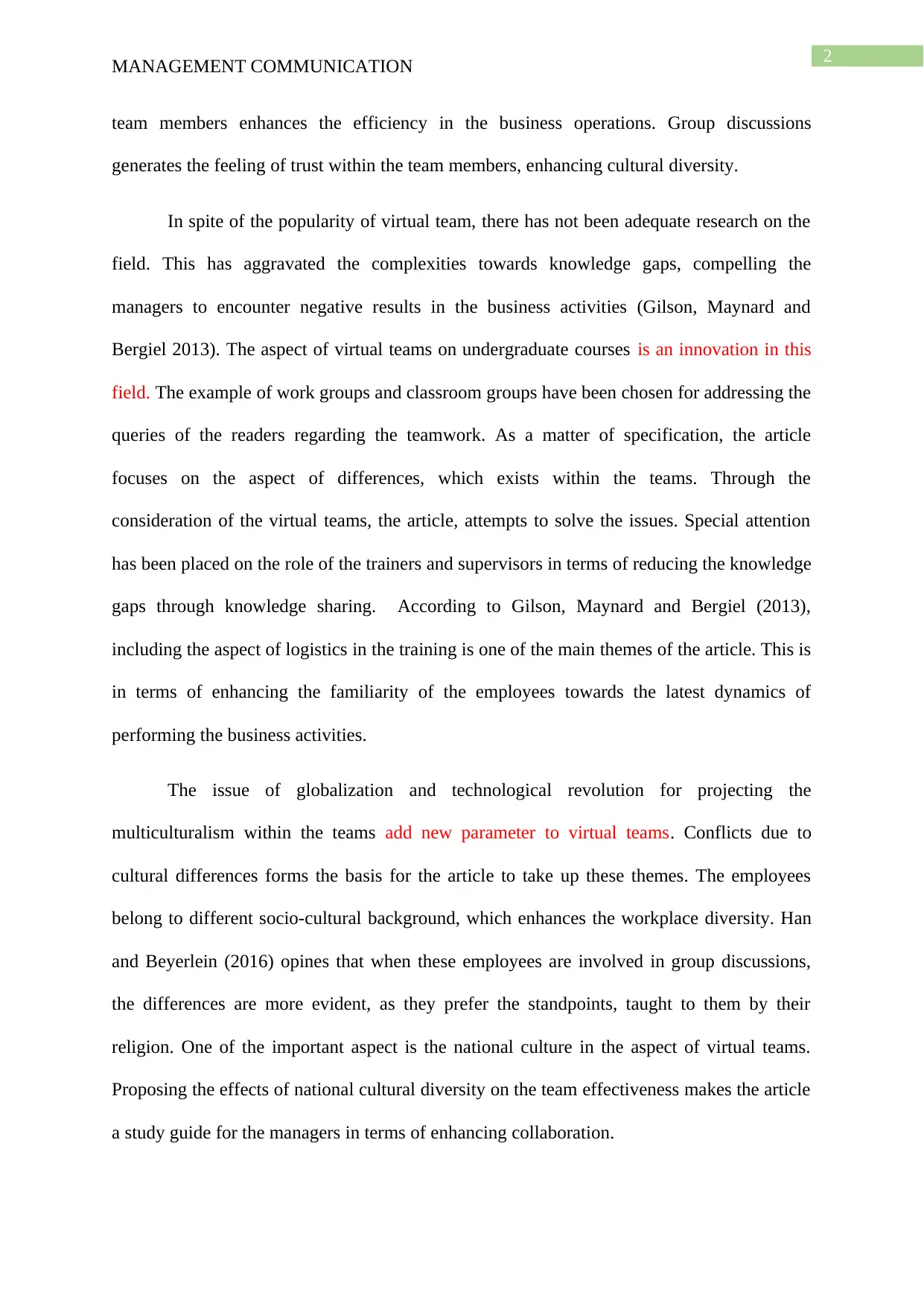
2
MANAGEMENT COMMUNICATION
team members enhances the efficiency in the business operations. Group discussions
generates the feeling of trust within the team members, enhancing cultural diversity.
In spite of the popularity of virtual team, there has not been adequate research on the
field. This has aggravated the complexities towards knowledge gaps, compelling the
managers to encounter negative results in the business activities (Gilson, Maynard and
Bergiel 2013). The aspect of virtual teams on undergraduate courses is an innovation in this
field. The example of work groups and classroom groups have been chosen for addressing the
queries of the readers regarding the teamwork. As a matter of specification, the article
focuses on the aspect of differences, which exists within the teams. Through the
consideration of the virtual teams, the article, attempts to solve the issues. Special attention
has been placed on the role of the trainers and supervisors in terms of reducing the knowledge
gaps through knowledge sharing. According to Gilson, Maynard and Bergiel (2013),
including the aspect of logistics in the training is one of the main themes of the article. This is
in terms of enhancing the familiarity of the employees towards the latest dynamics of
performing the business activities.
The issue of globalization and technological revolution for projecting the
multiculturalism within the teams add new parameter to virtual teams. Conflicts due to
cultural differences forms the basis for the article to take up these themes. The employees
belong to different socio-cultural background, which enhances the workplace diversity. Han
and Beyerlein (2016) opines that when these employees are involved in group discussions,
the differences are more evident, as they prefer the standpoints, taught to them by their
religion. One of the important aspect is the national culture in the aspect of virtual teams.
Proposing the effects of national cultural diversity on the team effectiveness makes the article
a study guide for the managers in terms of enhancing collaboration.
MANAGEMENT COMMUNICATION
team members enhances the efficiency in the business operations. Group discussions
generates the feeling of trust within the team members, enhancing cultural diversity.
In spite of the popularity of virtual team, there has not been adequate research on the
field. This has aggravated the complexities towards knowledge gaps, compelling the
managers to encounter negative results in the business activities (Gilson, Maynard and
Bergiel 2013). The aspect of virtual teams on undergraduate courses is an innovation in this
field. The example of work groups and classroom groups have been chosen for addressing the
queries of the readers regarding the teamwork. As a matter of specification, the article
focuses on the aspect of differences, which exists within the teams. Through the
consideration of the virtual teams, the article, attempts to solve the issues. Special attention
has been placed on the role of the trainers and supervisors in terms of reducing the knowledge
gaps through knowledge sharing. According to Gilson, Maynard and Bergiel (2013),
including the aspect of logistics in the training is one of the main themes of the article. This is
in terms of enhancing the familiarity of the employees towards the latest dynamics of
performing the business activities.
The issue of globalization and technological revolution for projecting the
multiculturalism within the teams add new parameter to virtual teams. Conflicts due to
cultural differences forms the basis for the article to take up these themes. The employees
belong to different socio-cultural background, which enhances the workplace diversity. Han
and Beyerlein (2016) opines that when these employees are involved in group discussions,
the differences are more evident, as they prefer the standpoints, taught to them by their
religion. One of the important aspect is the national culture in the aspect of virtual teams.
Proposing the effects of national cultural diversity on the team effectiveness makes the article
a study guide for the managers in terms of enhancing collaboration.
⊘ This is a preview!⊘
Do you want full access?
Subscribe today to unlock all pages.

Trusted by 1+ million students worldwide
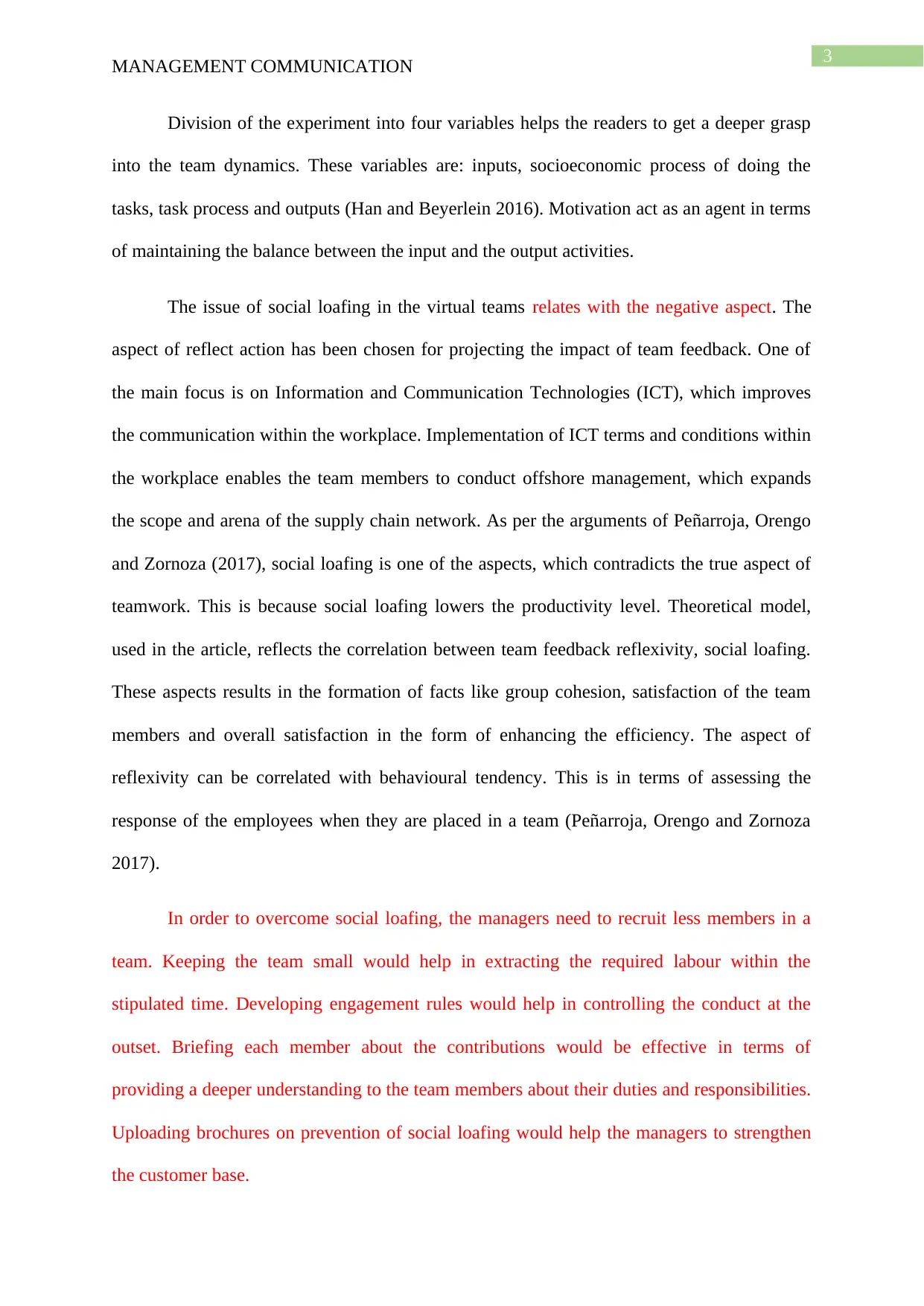
3
MANAGEMENT COMMUNICATION
Division of the experiment into four variables helps the readers to get a deeper grasp
into the team dynamics. These variables are: inputs, socioeconomic process of doing the
tasks, task process and outputs (Han and Beyerlein 2016). Motivation act as an agent in terms
of maintaining the balance between the input and the output activities.
The issue of social loafing in the virtual teams relates with the negative aspect. The
aspect of reflect action has been chosen for projecting the impact of team feedback. One of
the main focus is on Information and Communication Technologies (ICT), which improves
the communication within the workplace. Implementation of ICT terms and conditions within
the workplace enables the team members to conduct offshore management, which expands
the scope and arena of the supply chain network. As per the arguments of Peñarroja, Orengo
and Zornoza (2017), social loafing is one of the aspects, which contradicts the true aspect of
teamwork. This is because social loafing lowers the productivity level. Theoretical model,
used in the article, reflects the correlation between team feedback reflexivity, social loafing.
These aspects results in the formation of facts like group cohesion, satisfaction of the team
members and overall satisfaction in the form of enhancing the efficiency. The aspect of
reflexivity can be correlated with behavioural tendency. This is in terms of assessing the
response of the employees when they are placed in a team (Peñarroja, Orengo and Zornoza
2017).
In order to overcome social loafing, the managers need to recruit less members in a
team. Keeping the team small would help in extracting the required labour within the
stipulated time. Developing engagement rules would help in controlling the conduct at the
outset. Briefing each member about the contributions would be effective in terms of
providing a deeper understanding to the team members about their duties and responsibilities.
Uploading brochures on prevention of social loafing would help the managers to strengthen
the customer base.
MANAGEMENT COMMUNICATION
Division of the experiment into four variables helps the readers to get a deeper grasp
into the team dynamics. These variables are: inputs, socioeconomic process of doing the
tasks, task process and outputs (Han and Beyerlein 2016). Motivation act as an agent in terms
of maintaining the balance between the input and the output activities.
The issue of social loafing in the virtual teams relates with the negative aspect. The
aspect of reflect action has been chosen for projecting the impact of team feedback. One of
the main focus is on Information and Communication Technologies (ICT), which improves
the communication within the workplace. Implementation of ICT terms and conditions within
the workplace enables the team members to conduct offshore management, which expands
the scope and arena of the supply chain network. As per the arguments of Peñarroja, Orengo
and Zornoza (2017), social loafing is one of the aspects, which contradicts the true aspect of
teamwork. This is because social loafing lowers the productivity level. Theoretical model,
used in the article, reflects the correlation between team feedback reflexivity, social loafing.
These aspects results in the formation of facts like group cohesion, satisfaction of the team
members and overall satisfaction in the form of enhancing the efficiency. The aspect of
reflexivity can be correlated with behavioural tendency. This is in terms of assessing the
response of the employees when they are placed in a team (Peñarroja, Orengo and Zornoza
2017).
In order to overcome social loafing, the managers need to recruit less members in a
team. Keeping the team small would help in extracting the required labour within the
stipulated time. Developing engagement rules would help in controlling the conduct at the
outset. Briefing each member about the contributions would be effective in terms of
providing a deeper understanding to the team members about their duties and responsibilities.
Uploading brochures on prevention of social loafing would help the managers to strengthen
the customer base.
Paraphrase This Document
Need a fresh take? Get an instant paraphrase of this document with our AI Paraphraser
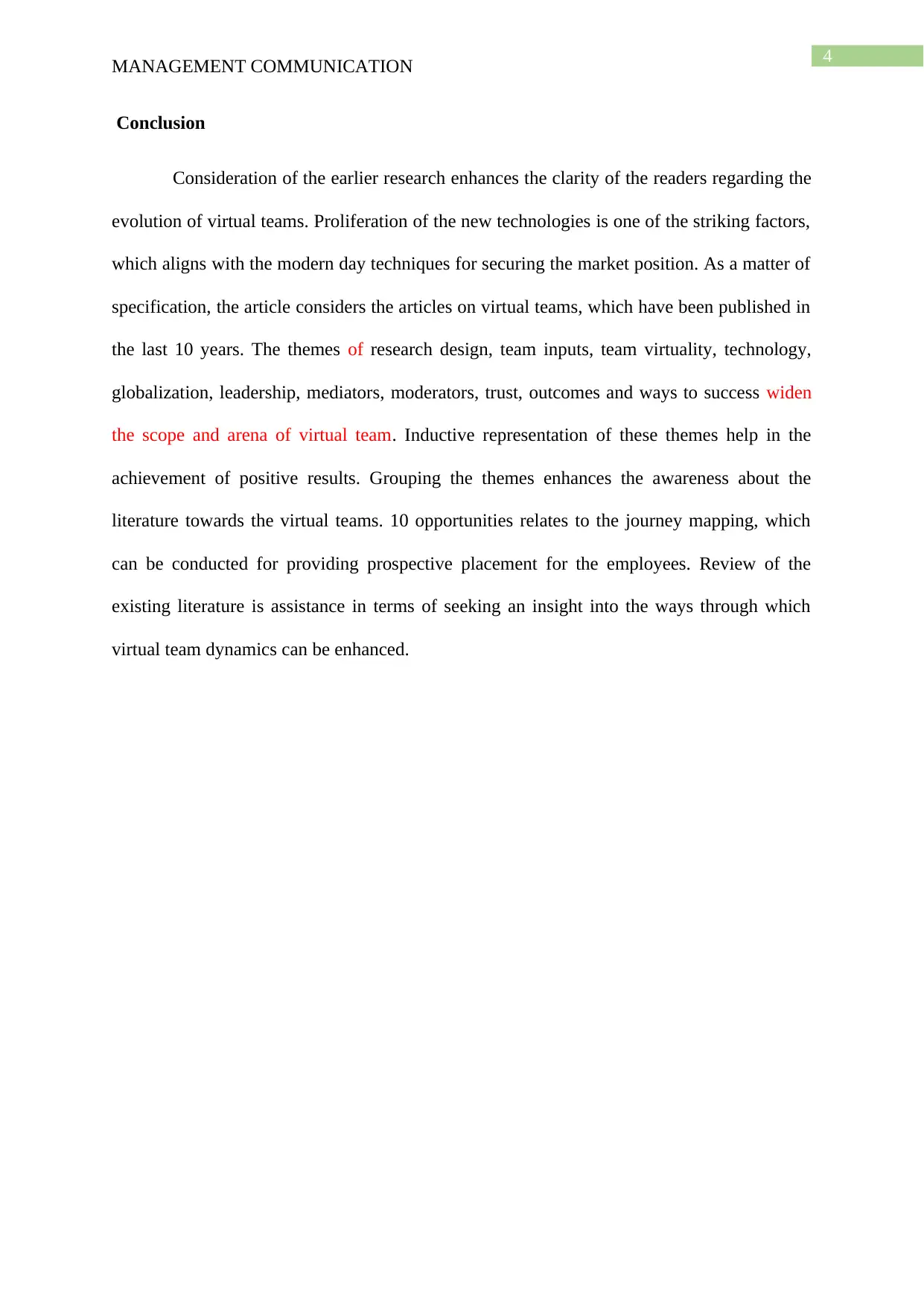
4
MANAGEMENT COMMUNICATION
Conclusion
Consideration of the earlier research enhances the clarity of the readers regarding the
evolution of virtual teams. Proliferation of the new technologies is one of the striking factors,
which aligns with the modern day techniques for securing the market position. As a matter of
specification, the article considers the articles on virtual teams, which have been published in
the last 10 years. The themes of research design, team inputs, team virtuality, technology,
globalization, leadership, mediators, moderators, trust, outcomes and ways to success widen
the scope and arena of virtual team. Inductive representation of these themes help in the
achievement of positive results. Grouping the themes enhances the awareness about the
literature towards the virtual teams. 10 opportunities relates to the journey mapping, which
can be conducted for providing prospective placement for the employees. Review of the
existing literature is assistance in terms of seeking an insight into the ways through which
virtual team dynamics can be enhanced.
MANAGEMENT COMMUNICATION
Conclusion
Consideration of the earlier research enhances the clarity of the readers regarding the
evolution of virtual teams. Proliferation of the new technologies is one of the striking factors,
which aligns with the modern day techniques for securing the market position. As a matter of
specification, the article considers the articles on virtual teams, which have been published in
the last 10 years. The themes of research design, team inputs, team virtuality, technology,
globalization, leadership, mediators, moderators, trust, outcomes and ways to success widen
the scope and arena of virtual team. Inductive representation of these themes help in the
achievement of positive results. Grouping the themes enhances the awareness about the
literature towards the virtual teams. 10 opportunities relates to the journey mapping, which
can be conducted for providing prospective placement for the employees. Review of the
existing literature is assistance in terms of seeking an insight into the ways through which
virtual team dynamics can be enhanced.
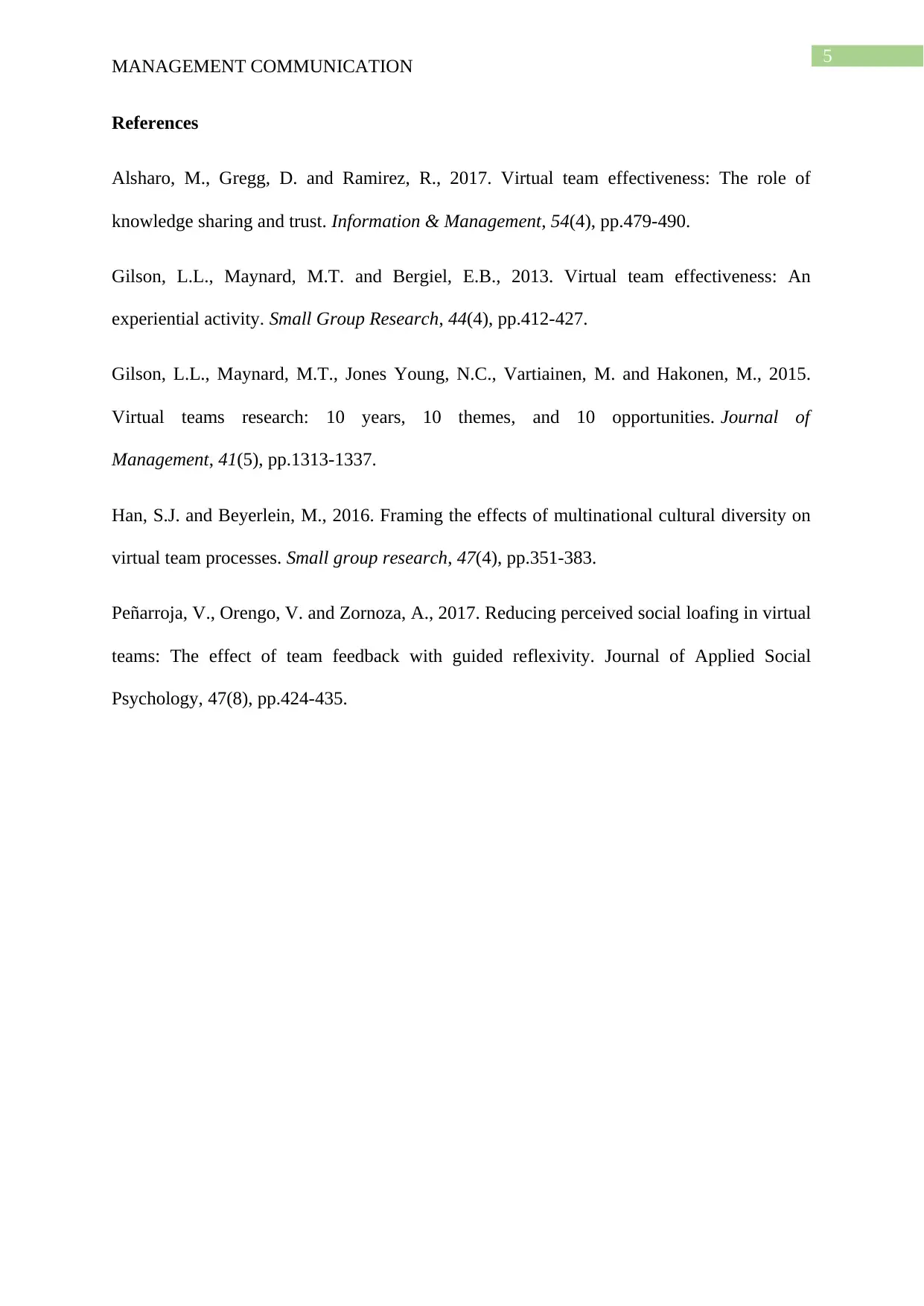
5
MANAGEMENT COMMUNICATION
References
Alsharo, M., Gregg, D. and Ramirez, R., 2017. Virtual team effectiveness: The role of
knowledge sharing and trust. Information & Management, 54(4), pp.479-490.
Gilson, L.L., Maynard, M.T. and Bergiel, E.B., 2013. Virtual team effectiveness: An
experiential activity. Small Group Research, 44(4), pp.412-427.
Gilson, L.L., Maynard, M.T., Jones Young, N.C., Vartiainen, M. and Hakonen, M., 2015.
Virtual teams research: 10 years, 10 themes, and 10 opportunities. Journal of
Management, 41(5), pp.1313-1337.
Han, S.J. and Beyerlein, M., 2016. Framing the effects of multinational cultural diversity on
virtual team processes. Small group research, 47(4), pp.351-383.
Peñarroja, V., Orengo, V. and Zornoza, A., 2017. Reducing perceived social loafing in virtual
teams: The effect of team feedback with guided reflexivity. Journal of Applied Social
Psychology, 47(8), pp.424-435.
MANAGEMENT COMMUNICATION
References
Alsharo, M., Gregg, D. and Ramirez, R., 2017. Virtual team effectiveness: The role of
knowledge sharing and trust. Information & Management, 54(4), pp.479-490.
Gilson, L.L., Maynard, M.T. and Bergiel, E.B., 2013. Virtual team effectiveness: An
experiential activity. Small Group Research, 44(4), pp.412-427.
Gilson, L.L., Maynard, M.T., Jones Young, N.C., Vartiainen, M. and Hakonen, M., 2015.
Virtual teams research: 10 years, 10 themes, and 10 opportunities. Journal of
Management, 41(5), pp.1313-1337.
Han, S.J. and Beyerlein, M., 2016. Framing the effects of multinational cultural diversity on
virtual team processes. Small group research, 47(4), pp.351-383.
Peñarroja, V., Orengo, V. and Zornoza, A., 2017. Reducing perceived social loafing in virtual
teams: The effect of team feedback with guided reflexivity. Journal of Applied Social
Psychology, 47(8), pp.424-435.
⊘ This is a preview!⊘
Do you want full access?
Subscribe today to unlock all pages.

Trusted by 1+ million students worldwide
1 out of 6
Related Documents
Your All-in-One AI-Powered Toolkit for Academic Success.
+13062052269
info@desklib.com
Available 24*7 on WhatsApp / Email
![[object Object]](/_next/static/media/star-bottom.7253800d.svg)
Unlock your academic potential
Copyright © 2020–2026 A2Z Services. All Rights Reserved. Developed and managed by ZUCOL.





